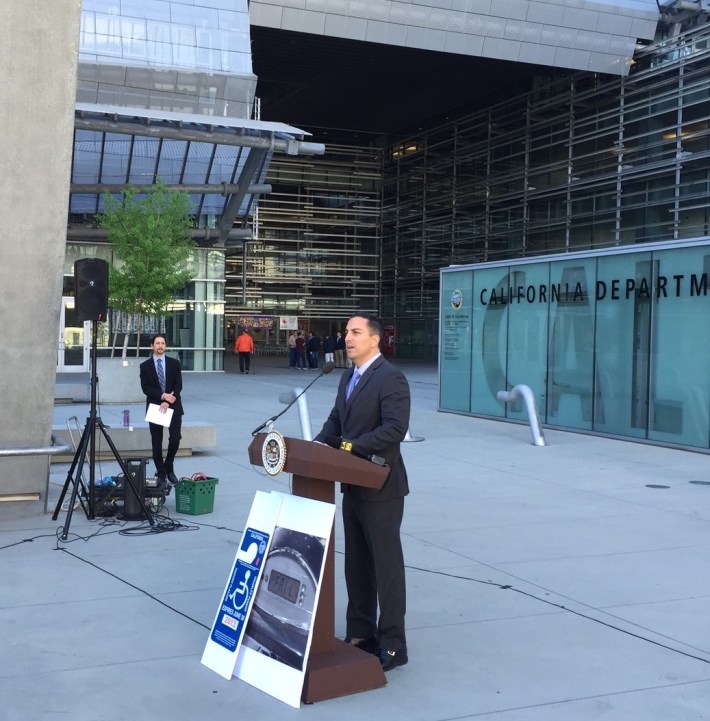
At a downtown Los Angeles press event this morning in front of Caltrans District 7 headquarters, Assemblymember Mike Gatto (D-L.A., Glendale) explained two parking reform bills he recently introduced.
A.B. 2602 takes on parking issues related to disability placards. Disability placard abuse is a major parking issue for many cities, including Los Angeles, but change needs to begin at the state level to allow cities to implement solutions.
Gatto outlined the magnitude of placard abuse issues, citing state statistics: of 24 million CA drivers, three million have some form of disability parking placard, whether a permanent or temporary placard, or a disabled person license plate.
"Something is wrong," proclaimed Gatto, when one in eight California drivers claims a disability.
Municipalities cannot ticket cars parked at expired meters if they display a handicapped driver's placard. Thus, perfectly healthy scofflaw drivers regularly use illegally obtained placards to both cheat the city out of parking revenue and to turn a public parking space into their personal space because they are under no obligation to move their car.
In 2012, Los Angeles Times columnist Steve Lopez conducted his own placard sting and discovered that many placards were being illegally used by healthy drivers. Numerous other more recent governmental and media stings have shown placard abuse to be an ongoing issue.
Gatto had planned to introduce disability placard legislation in the 2013-14 legislative session, but delayed the bill to work more closely with disability advocates. Gatto stated that his office is working with advocacy organizations, some of whom support the bill in its current form.
Gatto also stumped for A.B. 2586 , the so-called "Parking Bill of Rights." From a livability perspective, this measure is a somewhat mixed bag. It promotes variable-priced parking, but also places some restrictions on how and when localities can enforce metered parking.
These bills will likely change in the course of the legislative process. After the jump is a summary of where they stand right now.
A.B 2586 - Parking Bill of Rights
- Requires local governments to make on-street parking spaces available immediately after street sweeping
- Prohibits cities from ticketing cars parked at broken meters - extending a sunsetting 2013 Gatto bill
- Prohibits private valet parking from barring cars from public street spaces
- Prohibits local governments from certain types of incentives in third party parking collections contracts
- Requires local governments to consider variable pricing when installing high-tech parking meters
- Prohibits local governments from charging fines for illegal parking due to criminal activity; for example, an owner of a stolen car would not be responsible for parking tickets that occurred after the theft.
A.B. 2602 - Disability Parking Placards
- Streamline the processes by which the DMV takes back disability placards after the death of the disabled person.
- Require re-application for disabled placards after a placard expires.
- Removes state restrictions, allowing local jurisdictions (that meet certain criteria) to charge for and to enforce time restrictions on disability placard parking.





